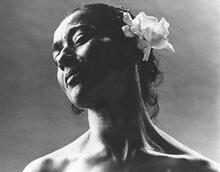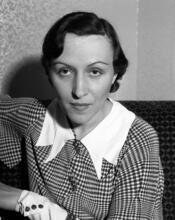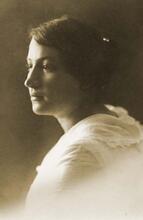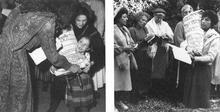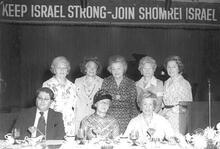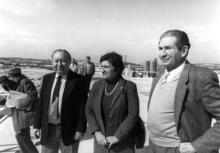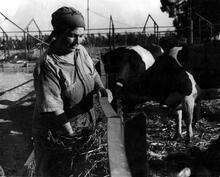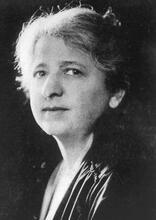Margot Klausner
Israeli film producer Margot Klausner in 1970. Photo courtesy of the Klausner family via Wikimedia Commons
Margot Klausner was born in 1905 to a wealthy Jewish family in Berlin. Together with her second husband, she was influential in bringing the Habima Theater to Palestine, and the couple served as the administrative managers of the theater in the first half of the 1930s. They founded the Israel Motion Picture Studios in Herzliya in 1949, which served numerous films and television productions in the country and produced the Carmel-Herzliya Newsreels. Klausner was a prolific writer, founder of the Israeli Parapsychology Society, and a popular public speaker on theater, film, and the occult in Israel.
Margot Klausner was co-founder and president of Israel’s major film and television studio and co-manager of the Habima Theater. She was an author, film producer, founder of the Israeli Parapsychology Society, publisher of the monthly magazine Mysterious Worlds: A Journal of Parapsychology, and a popular public speaker on theater, film, and the occult in Israel.
Family & Education
Klausner was born in Berlin on November 2, 1905, to Julius and Dora Klausner, owners of the Leiser chain of shoe stores. She took courses in Greek and history of art at the University of Berlin and worked at her family’s successful footwear business. In 1926 she married Zionist and future Jewish National Fund photographer, Dr. Jacob Rosner, and they travelled to Palestine on their honeymoon before returning to Berlin.
Habima Theater
Together with the Second Lit. "ascent." A "calling up" to the Torah during its reading in the synagogue.Aliyah Synagogue cantorhalutz Yehoshua Brandstatter, who would become her second husband, Klausner played a significant role in promoting and managing the Habima Theater. The Hebrew-language theater was founded in Moscow in 1916 and left the USSR, which had become inhospitable to the Jewish troupe, in 1926, garnering attention among Berlin’s Jewish elite as it toured Europe. Klausner, alongside other young wealthy Jews, took part in fundraising and in forming the theater’s administrative secretariat. Klausner and Brandstatter were influential in bringing Habima to tour Palestine in 1928, and from 1932 until the mid-1930s the couple served as the administrative managers of the theater, which had settled in Palestine in 1931. In order to arouse the interest of Palestine’s youth in the art of theater, Klausner also gave a weekly course on the history of drama at her home (“The Habima Youth Circle”). In 1936, after nine years, the couple had a falling out with the troupe and left the management of Habima, which would, after the founding of the State, become Israel’s national theater. Klausner and Brandstatter subsequently founded the Moadim play publishing house and agency and the National Jewish Stage ensemble in Poland, which they managed until 1938 and which presented the agency’s plays in Yiddish in an effort to promote theatrical works from the Land of Israel in the Jewish Diaspora.
Film
In 1933, Klausner and Brandstatter established Urim, a film production company. They produced their first film, Land of Promise, in 1933, in cooperation with Keren Hayesod, the Jewish Agency’s fundraising arm. The film, one of the most important documentaries of the Zionist period, won a prize at the Venice Film Festival in 1935. Other Urim company productions included Out of Evil (1950), Tomorrow is a Wonderful Day (1947), and Avodah (1935).
In 1949, Klausner and Brandstatter invested their personal resources in building the first film studio in Israel, known as the Israel Motion Picture Studios Herzliya Ltd. A sound stage and film laboratory were opened in 1952, color services were added in 1969, and in the early 1970s, satellite facilities were introduced. The first film to appear with the production credit of the new studios was the documentary The New Pioneers, released by Paramount in 1950. In 1956, Klausner acquired 50% of Carmel Newsreels; two years later she acquired the other 50%. From that time until the demise of newsreels with the beginnings of Israeli television in 1968, the Studios produced hundreds of weekly Carmel-Herzliya Newsreels.
During the first 25 years of the Studios, Klausner produced five feature films: Jonathan and Tali (1953); The Boy Across the Street (1966), a prizewinner at the Venice Film Festival; Sabina and Her Men (1966); The Prodigal Son (1968); and Tamar Wife of Er (1972). In addition, she invested in some of the most important films of the period, including Tent City, Every Mile a Stone, Hill 24 Doesn’t Answer, Clouds Over Israel, The Policeman, The Hero’s Wife, Peeping Toms, and Big Eyes. During this period, the Studios’ laboratory processed 1,000 documentaries, 850 advertising films, 400 newsreels, 1,100 television productions, and 100 feature films.
Writing
From the 1920s to her death in Israel in 1975, Klausner published numerous works in German, Hebrew, and English, including theater reviews, a psychoanalytically inspired two-volume study on the sources of drama that explores cultural similarities across the ancient world, a historical novel on Sappho of Lesbos, a book on the last month of Zionist leader Chaim Arlosoroff’s life, a play on Joseph in Egypt, memoirs of her experience with Habima, of her visits to the USSR, and of her involvement with film and television, and many short stories that were often based on her life (and some of the stories that took place in the past were, according to Klausner, a passionate advocate of reincarnation, based on her previous lives). Many of her works were devoted to exploring the experiences of women. She co-wrote the feature film Sabina and Her Men (directed by Peter Freistadt) and the short film Jonathan and Tali (directed by Henry Schneider) and one of her short stories was adapted into the feature film The Hero’s Wife (directed by Peter Frye, 1963).
In her writing, Klausner sees cinema and parapsychology as tools in the service of the Zionist movement in Mandatory Palestine and the State of Israel. Her accounts of spiritualist communications frequently concern the fate of the country, such as warnings of future wars and comforting messages from the beyond, some from eminent deceased figures including Theodor Herzl. She viewed films and satellite television as means for propagating Israeli culture throughout the world and was committed to bringing foreign talent and co-productions to Israel in order to enhance and develop its culture.
Klausner had two children: a daughter, psychologist Dr. Miriam Spielmann (1927-2011), with her first husband, and a son, actor and author Amos Mokadi (born 1931),with her second husband.
Selected Works
Sappho of Lesbos: A Historical Novel. Tel Aviv: Massada, 1945 (Hebrew).
The Sources of Drama. Vol. 1. Tel Aviv: Massada, 1953/4 (Hebrew).
The Sources of Drama. Vol. 2. Ramat Gan: Massada, 1971 (Hebrew).
Disembodied Souls: Stories. Tel Aviv: Niv, 1963 (Hebrew).
Sivan Storm: The Last Affair in the Life of Chaim Arlosoroff. Tel Aviv: Sifre Gadish, 1956 (Hebrew).
Kühn wie der Tod: Novellen. Frankfurt a.M.: Ner Tamid Verlag, 1964.
Joseph in Egypt. Tel Aviv: Niv/Moadim,1965 (Hebrew).
Habima Diary. Tel Aviv: Moadim, 1971.
Julius Klausner - eine Biographie. Düsseldorf-Benrath: Verlag Kalima-Druck, 1974.
The Dream Industry, Memories and Facts—Twenty-five Years of the Israel Motion Picture Studios. Israel Motion Picture. Studios Herzliya, 1974.
Reincarnation. Ramat-Gan: Massada, 1975.
Hagin, Boaz. “Margot Klausner and the Pioneering of Israeli Cinema.” Screen 59, no. 2 (Summer 2018): 158–175.
von der Lühe, Barbara. “UFA-Stadt in Herzlya. Margot Klausner und die ‘Israel Motion Picture Studios Ltd.’” Filmexil, no. 11 (1998): 33–49.
Zer-Zion, Shelly. Habima in Berlin: The Institutionalization of a Zionist Theatre. Jerusalem: The Hebrew University Magnes Press, 2015 (Hebrew).
Zer-Zion, Shelly and Jan Kühne. “The German Archive of the Hebrew Habima: Bureaucracy and Identity.” Naharaim: Zeitschrift für deutsch-jüdische Literatur und Kulturgeschichte 7, nos. 1-2 (2013): 239–260.


